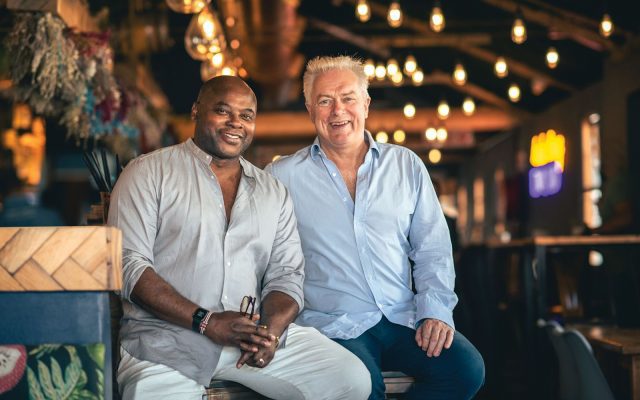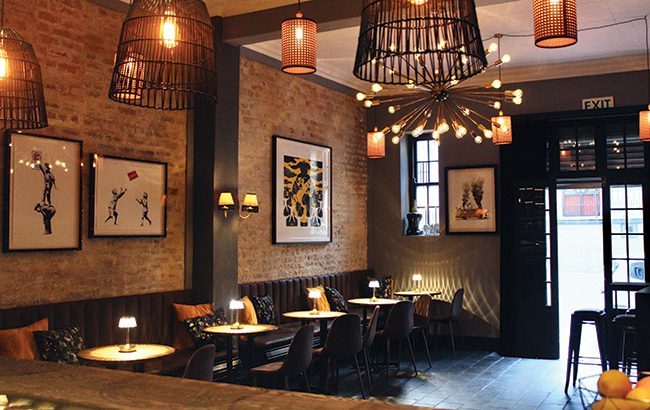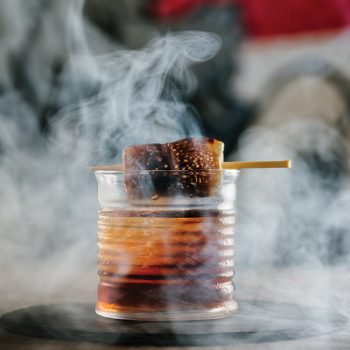Ajabu: Africa’s first bi-annual cocktail festival
This month South Africa plays host to cocktail festival Ajabu. Founders Mark Talbot Holmes and Colin Asare-Appiah reveal their ambitions for the event.

“One thing that’s come across to me since I’ve been going to Africa (and it’s all very new to me by the way, I’ve been twice now) is how sophisticated the bar scene is,” says Mark Talbot Holmes.
Since he began bringing Ajabu to life – billed as Africa’s first bi-annual international cocktail and spirits festival – Talbot Holmes has called the experience a real “eye opener”. “The diversity of culture, the diversity of ingredients and the absolutely incredible quality of the hospitality industry, the bar staff and cocktails all totally knocked me for six,” he says. “I feel rather ignorant that I didn’t realise this before, and had this rather ‘looking into a fishbowl’ attitude.”
Shining a light not just on ‘Africa’ but on “an incredible continent of 54 countries” is a big reason why Talbot Holmes says the festival is so important. He and business partner Colin Asare-Appiah are running Ajabu – meaning ‘wondrous’ in Swahili – in two South African cities in March. It kicks off in Johannesburg (10-13 March), followed by Cape Town (14-17 March) – and will go again in November.
 Power of community
Power of community
The pair are seasoned drinks industry veterans, with Talbot Holmes the founder of U’Luvka Vodka, and Asare-Appiah, now senior portfolio ambassador for Bacardi, known for his London bar work through the 1990s and for co-founding the London Academy of Bartending (Lab) in Soho. “I was born in Ghana, so very Afro-centric, and I grew up in sunny south London,” Asare-Appiah says. “I’ve always understood the power of community and spaces and places where people can create and connect together, and a lot of these have been at cocktail festivals and awards ceremonies around the world. I’ve seen first hand what these events can do, and for years I have been thinking about ways to knit the communities in the continent together. Now is the right moment in time to have a cocktail festival in South Africa.”
As a cocktail continent, Africa is “full of such opportunities which haven’t really been tapped yet”, Talbot Holmes says – and there are many challenges that its bar teams face to connect with the rest of the world. “There are lots of people doing amazing things around the continent but they are not being connected together,” explains Asare-Appiah. “Because of things like salary gaps and socio-economic conditions, lots of bartenders in Africa can’t fly to all these international festivals like Tales of the Cocktail (TOTC) or Bar Convent Berlin.”
While social media platforms – especially after the pandemic – have made society more connected, Asare-Appiah is quick to note that now is the time to meet in person. “The idea is to physically bring people to the continent to see the great work, because for the most part it’s easier for people in Europe and the Americas to travel to Africa than vice versa.”
Numerous big-name bars will fly over to South Africa, including Allegory (Washington DC), Front/Back (Ghana), Hero Bar (Nairobi), Rayo (Mexico City), Sweet Liberty (Miami), and Trailer Happiness (London). Don’t call these ‘takeovers’ though. “We’re aware of using the word ‘takeover’ – we’re not coming with any colonialist ideals here. We are not taking over anything. The idea of these mash-ups and partnerships is to provide an organic area and a moment for local and international bars to meet,” Asare-Appiah makes clear.
Connect and collaborate
Instead, he calls Ajabu a “series of collaborations between international and local pop-ups with a big social piece. We’ve focused on the connected and collaborative, it’s not: ‘Oh, here’s a cocktail festival, we’re going to stand up and talk to you’,” he adds. “We have some magic being created for consumers, and also for the partner bars – they are going to go away with, hopefully, new friendships, ideas, and ways of thinking.”
As for pinpointing highlights, Asare-Appiah is excited about Allegory’s Kapri Robinson, who was on Netflix’s Drink Masters TV programme, and who founded Chocolate City’s Best, a platform that celebrates bartenders, predominantly African-Americans and the LGBT+ community out of Washington, DC, and the US. However, he also isn’t one to pick favourites: “They are all fantastic bars in their own rights, and that they are pioneering is the highlight.”
While the undercurrent is connecting and inspiring bartenders, Talbot Holmes notes a major part of the festival is also about helping out the community. For instance, they’ve been given more than 40 scholarships by various parties for Wine & Spirit Education Trust courses and Professional Bar Training.
He says: “It’s caught people’s imaginations, and that’s also what this festival is about. It’s about getting young bartenders to get involved and educate them. We’re giving an opportunity for these young bartenders and those who have been in the industry for a while to have courses that they wouldn’t otherwise be able to have – and which can only be a good thing for the industry.”
Asare-Appiah echoes the sentiment: “Education is the foundation to any growth, and I believe having these scholarships available for these local bartenders to apply for is going to be game changing.”

New ingredients
Along with the people present, visitors can also expect to discover a host of new (to them) ingredients, which Talbot Holmes and Asare-Appiah say is a trend at the forefront of the African bar scene.
“I really like fynbos and snake bush,” Talbot Holmes says. “They’re herbs from the Cape, which snakes hide under. They’re pungent, aromatic, and perfumed, and give a unique flavour to the drinks that they are used in.”
Asare-Appiah continues: “Everyone here is using similar techniques to the rest of the world, but they are adding amazing ingredients that are underutilised. Things like bissap and sorrell.”
Ultimately, the two believe they are onto something special. “Everyone is ringing up and asking ‘how can we get involved?’, rather than me doing the ringing, and that is very rare,” Talbot Holmes says. “It has really caught people’s imagination.”
Asare-Appiah looks at the impact TOTC’s Tales on Tour had on Mexico City’s cocktail community, which is still felt to this day, as an example of what they can potentially bring to Africa with Ajabu. “After Tales on Tour went there you just saw a marked growth in the city’s cocktail culture. Mexico has become one of the giants.”
Related news
Local and foreign spirits are neck and neck in South Africa

 Power of community
Power of community